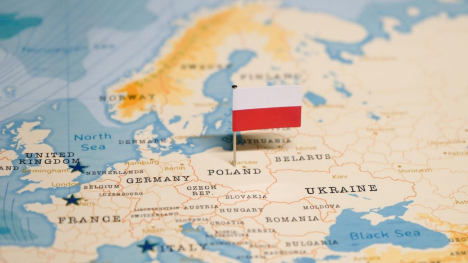
As the conflict in Ukraine continues, Poland has played an increasingly important role in mitigating tensions along NATO and the EU’s easternmost flank. Although Poland, Latvia, Lithuania, and Estonia have jointly made-up Europe’s eastern front as NATO allies and members of the EU for nearly 20 years, the strategic importance of their location has come to light as concerns over Belarus’s alliance with Russia and the status of Kaliningrad, the Russian exclave on the Baltic Sea which borders both Poland and Lithuania, are mounting.
Where Ukraine had previously provided a buffer between Russia and the rest of Europe, the conflict there has catapulted Poland to a new position of relevance and power in safeguarding Europe against Russian and Belarusian aggression.
Historically, Poland is no stranger to the importance of borders. Changing borders and rotating sovereignty have informed much of Poland’s modern existence. In fact, Poland ceased to exist entirely between 1795 and 1918 after being divided between the Kingdom of Prussia, Austria,
and the Russian Empire. Between 1918 and the end of the Second World War, Poland’s territory was constantly in flux due to fighting with the Soviet Union, separatist groups, and the looming threat of Germany to the West, which ultimately annexed much of Poland by the end of the war.
Most recently, however, Poland played a role on the other side of things as one of the westernmost members of the Communist bloc during the Cold War.
These historical factors have left Poland torn between the East and West; both are aware of the influence of national borders and familiar with the complicated question of what it means to be European. Poland’s unique experience could influence how it responds to conflict on its borders moving forward and make it an invaluable guide in rethinking Europe’s eastern flank.
Informed as it is of the precarious nature of borders, Poland initially navigated the conflict on Europe’s eastern flank by investing in military modernization and coordinating protection measures between Lithuania, Latvia, and Estonia. This has called into question the traditional power balance in the EU. Germany and France, traditionally viewed as the strongest leaders of the EU, have been somewhat displaced as they struggle to keep pace with Poland’s new defense measures and military investment.
Poland spearheaded a movement to provide Ukraine with Leopard 2 tanks despite initial hesitancy from Germany. It has also invested in defense systems from the United States, Israel, and South Korea to prepare itself for potential conflict with Russia.
Poland’s swift military responses and political jockeying against typical EU powerhouses have, in many ways, increased the importance of Central Europe in the EU and invited a shift in the center of gravity within the continent. It has stepped up to modernize its military speedily.
It has brokered important defense deals with the United States and other nations, setting aside the Europe-first sentiments that have caused recent strife between France and Germany and tension among EU members. Poland has also helped install a more robust NATO presence across the eastern border of Europe by establishing a permanent US presence within its borders that can also provide rotational support in the region.
However, Poland has recently indicated that the country has stopped sending arms to Ukraine and has indicated a shift to arming its own military. This is clearly a sign that resources are dwindling, and concerns of a larger European war are increasing.
Poland’s commitment to defending the EU’s and NATO’s eastern flank could not come at a more opportune time. Over the past several months, Belarus has increased its military operations, which are now directed by the displaced Wagner mercenaries along its borders with Lithuania and Poland.
In response to increased activity along the border with Belarus and an incursion of Belarusian aircraft into Polish airspace last week, Poland’s defense ministry has sent an additional 1,000 troops to the border to help deter further unwanted military activity in the area. Most of the provocative military exercises, which Belarusian officials have insisted are drills to teach troops about Russia’s special military operation--the Russian term for its invasion of Ukraine, have taken place in the Grodno region of Belarus, an area close to the Suwalki Gap.
The Suwalki Gap is the area that divides Belarus from the Russian exclave of Kaliningrad (formerly German and Polish territory). This area is separate from the Russian mainland and allows Russia to maintain a strong presence on the Baltic Sea.
Putin’s response to the Polish decision to shift troops to the area included a baseless claim that Poland was attempting to annex territories in Belarus and Ukraine as well as a threatening statement implying Poland’s existence was tied directly to Russian generosity and that it would remind Poland of its debt to Russia. These claims are reminiscent of some Russian disinformation campaigns that preceded the invasion of Ukraine and can be viewed as a tool of Russia’s hybrid warfare.
Poland’s existence in the arena between established and emerging political leaders within the EU presents a unique dilemma for establishing a unified approach to the Ukraine war.
Importantly, Poland has garnered sway as an influential broker of defense deals in the region, able to apply pressure on the larger EU and NATO members to mobilize arms and troops and facilitate support to the Baltic region. Businesses looking to take advantage of the defense market in the area will find several opportunities for deals with Poland and NATO in the region as it races to defend against mounting pressure from Russia.
For companies looking to invest in a potentially up-and-coming European power, Poland may be the perfect choice, especially as the center of gravity in the EU seems to be slightly shifting away from Western Europe and into Central Europe, where Poland is undoubtedly a strong point of the region.
Of further significance, Poland has recently seen rapidly shifting political winds, including a change in political leadership. It will be important for any company doing business in the region to understand the recent political trends, as this can dramatically impact defense spending and the larger regulatory landscape. In addition, a thorough understanding of the sanctions regimes in place is necessary, given the geographic proximity to Russia and Belarus.
To learn more about risk management and how Infortal can help you identify, assess, and mitigate risks, reach out today.



